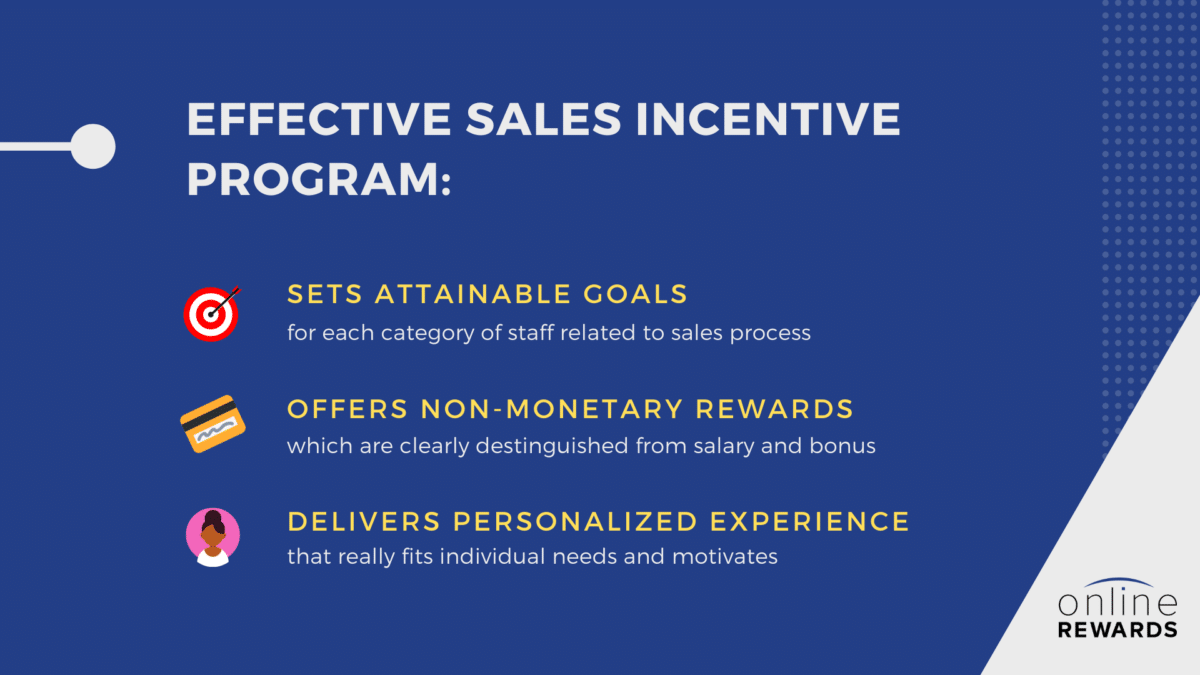Creative Ways to Improve Sales Team Performance
Sales incentive background
Sales incentive programs are a proven instrument for boosting the performance of sales teams across all kinds of companies. They create healthy competition and a positive environment designed to help companies achieve structured objectives. A well-designed sales incentive program will contribute directly to a company’s bottom line by driving specific sales outcomes and tying program costs to the achievement of sales outcomes.
Identify the best culture fit
When considering an implementation of a new sales incentive program, or the update of an existing one, it’s essential to ask yourself, “Why?” Asking why ensures that you take a deeper dive into the core of the issue and the reasons behind the solution–implementing a sales incentive program.
Clarify the following issues:
- What is the current role of incentives in your compensation plans?
- Which of the current incentives play their role as mandated?
- Which of the offered incentives were unpopular, and why?
- Which generational and socio-cultural groups are represented among your sales teams?
A survey or meeting will help you to identify the best bets and minimize the number of errors. Don’t expect to find an option that will satisfy everyone in the team. Programs that offer multiple choices are proven to work best for any company.
Have some important conversations
Many sales team managers have some sort of existing monetary reward system in place to encourage performance. And, while monetary compensation is often the go-to for employers, study after study shows that non-monetary compensation has more long-term success with engagement and productivity.
It is important to keep a clear line of communication regarding employees’ motivation to sell a product, as well as the pressure involved with incentivizing employees. Ensure that the intent behind the incentives is acknowledgement; not the reward itself.
Get creative with your incentives!
Today’s prospective employees say that company culture and recognition for their accomplishments outweigh compensation and benefits. It’s a well-known fact that companies with highly engaged workforces outperform their competitors by 147% in earnings per share.
Unique, non-monetary rewards tend to add an exciting dynamic to everyday work, as well as add a personal touch to what can be an otherwise monotonous day.

What sales incentives are the most appreciated and relevant to modern employees?
Incentives that support professional growth
Incentives that accelerate professional growth offer the most long-term benefits both for salespeople and the company. Possible options include:
- Sending an employee to an industry event, convention, or conference
- Signing up for an online course
- Gifting the latest books of recognized experts in fields related to economics, sales, marketing, or psychology
- Partial or full coverage of an advanced sales certification course
- Partial or full coverage of a language learning course
With the latest professional knowledge and new contacts, your sales team will be better prepared to respond to new challenges and opportunities, thereby contributing to the overall success of the company.
Incentives that enable personal development
“A decade of research in the business world proves that happiness raises nearly every business and educational outcome: raising sales by 37%, productivity by 31%, and accuracy on tasks by 19%, as well as a myriad of health and quality-of-life improvements.”
Skill development and hobbies like sports, arts, or cooking help people to recharge and improve their personal and professional performance. This category of incentives has an almost endless list of options both for the team and individual rewards. Just a few ideas:
- Tickets to the theatre, art exhibition, science fair, or a ballet performance
- Group workshop in baking, photography, public speaking and other, similar activities
- Collective participation in local sports, volunteering or charity events
- Mentoring time with the company or local industry leaders
Showing employees that you value their personalities and passions will help to establish long-term and productive relationships between them and the company.
Workplace incentives
Incentives that make job fulfillment easier and less stressful are very appreciated by all employees, including salespeople. This category of incentives could include:
- Option to work remotely
- Effectively organized work breaks (physical activity, meditation and the like)
- Extra paid time off
- Advanced office furniture and equipment upgrades a reward for the team achievements
Workplace incentives are excellent at keeping employees fresh, engaged, and productive. Salespeople who are always in a rush and spend much time communicating with people outside and inside of the company will definitely appreciate any of the options listed above.
Experiential rewards
A lot of today’s workers tend to prioritize experiences over things. Experiential rewards are highly valued by salespeople and could serve as an excellent motivator to exceed sales plans. This type of rewards falls into two categories: group and individual.
Some interesting insights on the impact of experiential rewards on salespeople
Examples of group incentives:
- Group incentive travel
- A weekend outing
- Lunch or dinner organized by company
- Collective attending of local sports or cultural events
Examples of individual incentives:
- Tickets to local shows and events
- Travel vouchers
- Flexible working schedule
- Additional paid time-off
Given the fact that positive emotions from experience last longer, experiential rewards are an excellent feel-good option to add to your incentives mix.
“Small luxuries”
There is a specific category of goods and services that everyone would like to use, but not everyone can psychologically justify buying. It refers to personal gadgets, time-saving services, or wellness activities. Typical examples include:
- Professional massage session
- Gift certificates to a local spa
- Gift certificates for a cleaning or any other home-related service
- Personal tech devices (as a part of your point-based rewards catalog)
Such incentives could help simplify daily routines, improve the sense of wellbeing, and free more time for personal and professional growth. Less stress leads to higher productivity, so this is another win-win option for the company and its employees.
SPIFFs
Setting SPIFFs (Sales Performance Incentive Funding Formula) will help you to adjust your incentives to each salesperson, which results in better motivation and sales outcomes. SPIFFs lets individuals choose the rewards for meeting the goals that were set for them.
Such practice helps companies to expand the reach of rewards programs from top performers to the whole team of salespeople and other workers involved in the sales process. It’s not that difficult to plan and enables maximum personalization, which is highly appreciated by all workers regardless of their age or socio-cultural background.
Not sure where to start?
Check our sales incentive solutions! Programs created by Online Rewards feature a participant dashboard, gamification, and custom catalogs with many exciting reward options, and will motivate and help retain high-performing employees.
Contact Online Rewards experts today to learn more!
What are the Benefits of Sales Incentives?
Sales incentives are a time-tested tool for leaders who want to improve motivation and engagement of internal and external salespeople. However, there’s a real art to choosing the right incentives, which are meaningful to employees, but at the same time, do not turn into ‘just another payment.’
What is the Definition of SPIFF?
SPIFF is short for ‘Sales Performance Incentive Funding Formula.’ SPIFFs help to align incentives with specific product and sales goals, increasing the effectiveness of any sales reward program.

